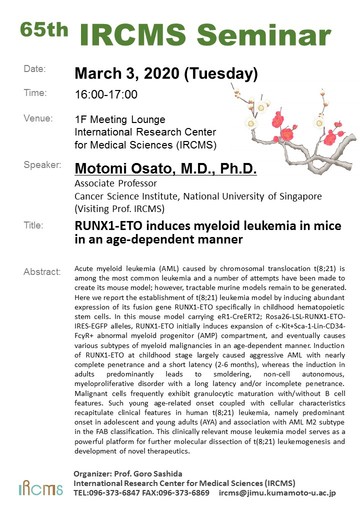- HOME
- IRCMS Seminars
- Cancelled [Mar 3] 65th IRCMS seminar
IRCMS Seminars
Cancelled [Mar 3] 65th IRCMS seminar
February 19 2020
This seminar was cancelled due to COVID-19.
We would like to inform you that the 65th IRCMS Seminar has been scheduled as below.
We would be pleased to see many of you participating in the seminar.
Date : March 3 (Tuesday)
Time : 16:00-17:00
Venue : IRCMS 1F Meeting Lounge
Speaker : Motomi Osato, M.D., Ph.D.
Associate Professor
Cancer Science Institute of Singapore, National University of Singapore,
(Visiting Professor, IRCMS)
Tilte : RUNX1-ETO induces myeloid leukemia in mice in an age-dependent manner
Abstract:
Acute myeloid leukemia (AML) caused by chromosomal translocation t(8;21) is among the most common leukemia and a number of attempts have been made to create its mouse model; however, tractable murine models remain to be generated. Here we report the establishment of t(8;21) leukemia model by inducing abundant expression of its fusion gene RUNX1-ETO specifically in childhood hematopoietic stem cells. In this mouse model carrying eR1-CreERT2; Rosa26-LSL-RUNX1-ETO-IRES-EGFP alleles, RUNX1-ETO initially induces expansion of c-Kit+Sca-1-Lin-CD34-FcγR+ abnormal myeloid progenitor (AMP) compartment, and eventually causes various subtypes of myeloid malignancies in an age-dependent manner. Induction of RUNX1-ETO at childhood stage largely caused aggressive AML with nearly complete penetrance and a short latency (2-6 months), whereas the induction in adults predominantly leads to smoldering, non-cell autonomous, myeloproliferative disorder with a long latency and/or incomplete penetrance. Malignant cells frequently exhibit granulocytic maturation with/without B cell features. Such young age-related onset coupled with cellular characteristics recapitulate clinical features in human t(8;21) leukemia, namely predominant onset in adolescent and young adults (AYA) and association with AML M2 subtype in the FAB classification. This clinically relevant mouse leukemia model serves as a powerful platform for further molecular dissection of t(8;21) leukemogenesis and development of novel therapeutics.

